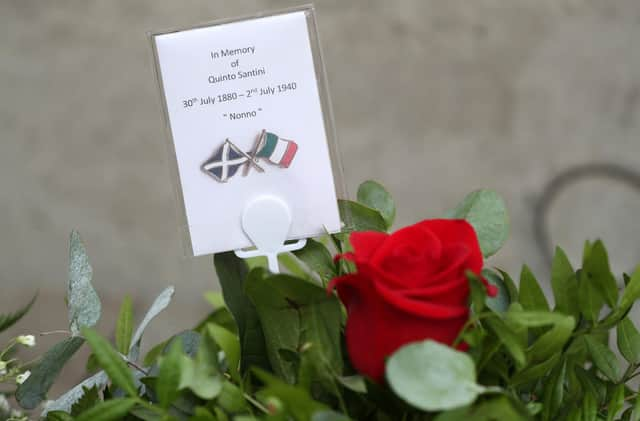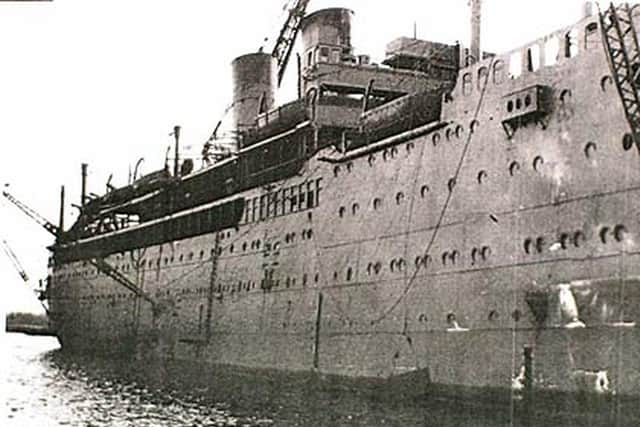Scotland and Italy remember 'atrocious' sinking of Arandora Star 80 years on


Among them were more than 100 Scots Italians who had been rounded up as “enemy aliens” after Mussolini declared war on Britain.
They were among those on the ship bound for an internment camp in Canada when it was mistaken by a warship and struck by a German torpedo off the coast of Donegal.
Advertisement
Hide AdAdvertisement
Hide AdThere was barely a family among the Scots Italian community who didn’t lose a father, husband or brother in the tragedy on July 2, 1940.


Today, Italian President Sergio Mattarella led tributes to those who died with his message shared at a special service at St Andrew’s Cathedral in Glasgow.
A service and day of commemoration was also held in Barga in Tuscany, from where 13 of the victims originally came form.
Mr Mattarella described the sinking and loss of life as an “atrocious episode, not always adequately remembered in the tragedy of war, which caused the death by drowning
of 865 people.”
He said those Italians being deported had been living in Britain for “some time, but defined as unwanted after Italy entered the war”.
He added: “Eighty years after that very sad event, I wish to commemorate those innocent victims and express feelings of closeness and solidarity to their descendants.”
At St Andrew’s Cathedral, where the Italian Cloister Garden remembers the Scottish victims, the service, which was broadcast online, was led by Canon Gerald Sharkey who said many Scots families had been affected by the tragedy. Flowers were laid by relatives of those who died.
In Barga, a memorial plaque to the disaster sits above the Stanze della Memoria to honour the victims.
Advertisement
Hide AdAdvertisement
Hide AdIn the town, which has built strong links with Scotland through decades of migration, the 80th anniversary was marked with a special mass, two conferences on the Arandora Star and the presentation of new research into the tragedy by several Glasgow-based historians.
Historian Raffaello Gonnella, whose own grandfather, Quinto Santini from Paisley died in the tragedy, told the BBC: “The tragedy of the Arandora Star will never be forgotten by these families and by the new generations of Scottish Italians as we continue to tell the story to many other non-Italian Scots.”
He said the disaster could “almost definitely” have been avoided if it had been made clear the ship was carrying internees.
Mr Gonnella added: “The Arandora Star sailed without any markings and was not part of any convoy. At least Red Cross markings should have been painted on the ship and why was such a prestigious ship allowed to make the journey alone?”
Rando Bertoia, a former watchmaker in Glasgow, was the last remaining Scots Italian survivor of the tragedy. He died in October 2013.
In 2010, he recalled how he was woken from his sleep on deck by a thump around 6am and then grabbed by a friend and pulled through a rail onto a lifeboat.
He said: “I can still remember the terrible sight of all the wee heads bobbing up and down, and we saw the ship go under and all was quiet. Men were crying for help, although you couldn’t do very much.”
A message from the Editor:Thank you for reading this story on our website. While I have your attention, I also have an important request to make of you.With the coronavirus lockdown having a major impact on many of our advertisers - and consequently the revenue we receive - we are more reliant than ever on you taking out a digital subscription.Subscribe to scotsman.com and enjoy unlimited access to Scottish news and information online and on our app. With a digital subscription, you can read more than 5 articles, see fewer ads, enjoy faster load times, and get access to exclusive newsletters and content. Visit https://www.scotsman.com/subscriptions now to sign up.
Advertisement
Hide AdAdvertisement
Hide AdOur journalism costs money and we rely on advertising, print and digital revenues to help to support them. By supporting us, we are able to support you in providing trusted, fact-checked content for this website.
Joy Yates
Editorial Director